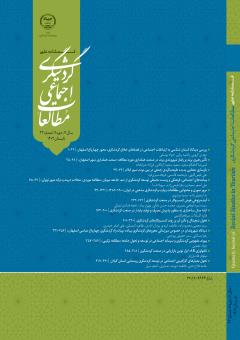پیامدهای اجتماعی، پیامدهای فرهنگی، پیامدهای زیست محیطی، دربند، درکه
محورهای موضوعی : مطالعات اجتماعی و گردشگری، جامعه شناسی گردشگریعلی اصغر سعیدی 1 , زهرا فرضی زاده 2 * , سهیلا تاسا 3
1 - عضو هیئت علمی دانشگاه تهران
2 - دانشگاه تهران
3 - دانشگاه تهران
کلید واژه: پیامدهای اجتماعی, پیامدهای فرهنگی, پیامدهای زیست محیطی, دربند, درکه,
چکیده مقاله :
هدف این پژوهش، مطالعه پیامدهای اجتماعی، فرهنگی و زیست محیطی توسعه گردشگری از دید جامعه میزبان در محلات دربند و درکه شهر تهران با روش کیفی است. افراد مورد مطالعه که 18 نفر از ساکنان بومی، صاحبان واحدهای پذیرائی و مسئولان محلی بودند، با روش نمونه گیری هدفمند انتخاب شدند. برای جمع آوری اطلاعات از مصاحبه نیمه ساختار یافته، مشاهده مشارکتی و غیرمشارکتی و برای تحلیل داده ها از روش تحلیل مضمون استفاده شده است. با تحلیل داده ها، 167 مفهوم، 17 مقوله فرعی و 4 مقوله اصلی به دست آمد. به علت شباهت محلات مورد مطالعه به لحاظ موقعیت جغرافیایی و جاذبه های موجود، توسعه گردشگری در این نواحی، پیامدهای شبیه به هم با اندکی تفاوت بر جای گذاشته است. در حوزه اقتصادی، گردشگری موجب افزایش درآمد، اشتغال زایی، تغییر منبع معیشت، درآمدهای کاذب پارکبانان و سودجویی برخی صاحبان رستوران ها از گردشگران خارجی شده است. گسترش تعاملات اجتماعی، شیوع برخی ناهنجاری های اجتماعی، مهاجرپذیری و ازدحام و شلوغی نیز از پیامدهای اجتماعی هستند. از نظر فرهنگی نیز به گسترش تبادلات فرهنگی و یادگیری زبان انگلیسی کمک شده و تا حدودی تضاد فرهنگی بین جوامع میزبان و مهمان پدید آمده است. آلودگی های زیستمحیطی، لطمه به پوشش گیاهی و حیات وحش، تغییرات کالبدی، تغییر کاربری اراضی، تلاش برای گسترش و ارتقاء رستورانها نیز در زمره پیامدهای زیستمحیطی قرار می گیرند.
This study sought to investigate the social, cultural, and environmental consequences of tourism development from the perspective of the host community in the Darband and Darake neighborhoods of Tehran using a qualitative approach. To this end, some eighteen people, including the owners of catering units, local officials, and residents of the neighborhoods were selected as the sample size via purposive sampling. The required data were collected through semi-structured interviews, participatory and non-participatory observation, which were then analyzed using content analysis. Finally, the analyzed data were categorized into 167 concepts, 17 subcategories, and four main categories. The findings of the study indicated that tourism development had brought about similar consequences for the studied neighborhoods (with slight differences) due to their similarity in terms of geographical location and existing attractions. Accordingly, tourism has, from the economic viewpoint, increased the revenues of the neighborhoods’ residents, boosted job opportunities, and changed the income resources. However, it paved the ground for some restaurant owners’ exploitation of foreign tourists and provided the traffic warden with false income. On the other hand, while the expansion of social interactions, the prevalence of some social anomalies, immigrant reception, and overcrowding were identified as the social consequences of tourism development in Darband and Darake neighborhoods, the development of cultural exchanges and learning English as a second language were found as the cultural consequences of such a development, contributing to cultural conflicts between the host and guest communities. Finally, environmental pollution, damages incurred to vegetation and wildlife, physical and land use changes, and the efforts made to increase the number of restaurants and improve their quality were identified as the main environmental consequences of tourism development in the neighborhoods mentioned above.
امینی، عباس و زیدی، زهرا. (1394) «تأثیرات فرهنگی گردشگری در مناطق روستایی از دید جامعه محلی (مطالعه موردی: روستای ابیانه)». فصلنامه تحقیقات جغرافیایی، 30(2)، 32-13.
پاکدوست، نوشین. (1390). «ساماندهی و توسعه فعالیت¬های مرتبط با فضاهای تفرجگاهی در شمال تهران، مورد مطالعه: رود- دره درکه». پایان¬نامه کارشناسی ارشد. دانشکده جغرافیا دانشگاه تهران.
تقدیسی، احمد، تقوایی، مسعود، و پیری، سیامک. (1391). «تحلیلی بر نگرش جامعه میزبان به اثرات اجتماعی- فرهنگی گردشگری شهرستان دالاهو». مجله علمی تخصصی برنامه¬ریزی فضایی، 2(1)، 140-121.
حسنوند، حمید. (1392). «بررسی اثرات اقتصادی، اجتماعی- فرهنگی و زیست¬محیطی ورود گردشگران به نواحی روستایی کهمان از توابع شهرستان سلسله». پایان¬نامه کارشناسی ارشد، دانشکده علوم اجتماعی، دانشگاه تهران.
ستوده، منوچهر. (1371). جغرافیای تاریخی شمیران. تهران: مؤسسه مطالعات و تحقیقات فرهنگی. جلد یک.
سجادی، اشرف و احمدی، فاطمه. (1392). «ارزیابی اثرات گردشگری روستایی شهرستان فومن از دیدگاه جامعه روستایی». فصلنامه علمی- پژوهشی مطالعات مدیریت گردشگری، 8(23)، 175-155.
شفیعی، زاهد و محمدی، امین. (1393). «بررسی تأثیرات توسعه گردشگری بر جامعه میزبان (نمونه موردی شهر چادگان)». فصلنامه جغرافیای سرزمین، 11(41)، 90-77.
کریمی، محبوبه. (1390). «بررسی نگرش جامعه میزبان به اثرات توسعه گردشگری، مطاله موردی: نیاسر کاشان». پایان¬نامه کارشناسی ارشد. دانشکده علوم اجتماعی دانشگاه تهران.
مرکز آمار ایران (1398). سرشماری سال 1390 و 1385. تهران: مرکز آمار ایران.
معاونت اجتماعی و فرهنگی شهرداری تهران. (1391 الف). محله¬ی ما: دربند. تهران: تندیس شب.
معاونت اجتماعی و فرهنگی شهرداری تهران. (1391 ب). محله¬ی ما: درکه. تهران: تندیس شب.
مؤیدی، محمد. (1388). «استفاده از طراحی شهری برای ارتقا سطح گردشگری درکه، نمونه موردی: طراحی محدوده میدان درکه». پایان¬نامه کارشناسی ارشد. دانشکده شهرسازی دانشگاه تهران.
Ahammed, Sh. S. (2010). "Impact of tourism in Cox’s Bazar, Bangladesh". Thesis, Nort South University, Bangladesh.
Andereck, K. L., Valentine, K. M., Knopf, R. C., & Vogt, Ch. A. (2005). Residents' perceptions of community tourism impacts. Annals of Tourism Research, 32(4), 1056-1076.
Jaafar, M., Rasoolimanesh, M., & Ismail, S. (2015). Perceived sociocultural impacts of tourism and community participation: A case study of Langkawi Island. Tourism and Hospitality Research, 1-12.
Long, Y. (2010). The social impacts of tourism development on Hainan Island. Vaasan Ammattikorkeakoulu, University of Applied Sciences.
Liu, J. C., & Var, T. (1986). Resident attitudes toward tourism impacts in Hawaii. Annals of Tourism Research, 13(2), 193-214.
Turker, N. (2013). Host community perceptions of tourism impacts: A case study on the world heritage City of Safranbolu, Turkey. Revista de cercetare si interventie sociala, 43, 115-141.
Wang, Y., & Pfister, R. E. (2008). Residents' attitudes toward tourism and perceived personal benefits in a rural community. Journal of Travel Research, 47, 84-93.

